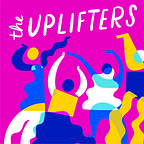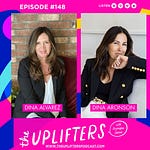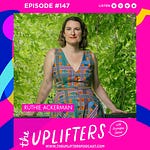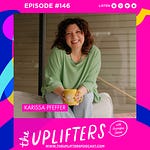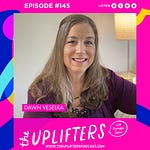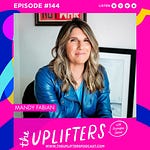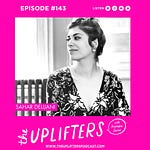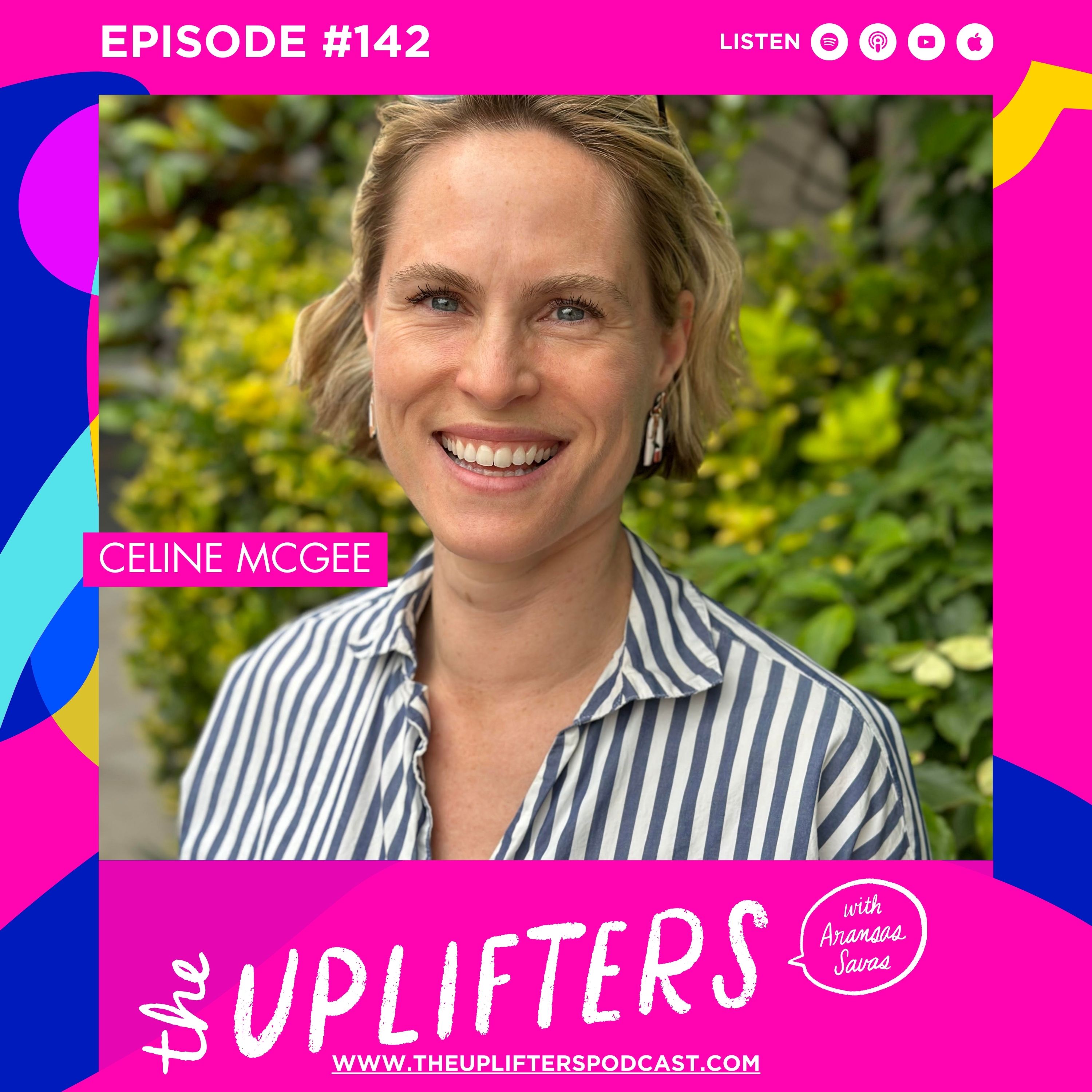”Sometimes life's greatest gifts are in the smallest things that make the biggest impact.” - Terri Tomoff
Listen to our latest episode in the player here, on Apple Podcasts, Spotify, YouTube, or wherever you get your podcasts.
This Week on The Uplifters
Ever feel like the hits just keep coming? In this episode, you’ll hear how Terri Tomoff, nominated for The Uplifters by Julie B. Hughes , got by with a little help from her friends, family, and a global community of champions during her son’s lifelong battles with recurring cancer.
When Terri Tomoff’s son Ryan was two years old, he was diagnosed with acute lymphoblastic leukemia with cerebral nervous system involvement. In the 27 years that followed, Ryan would relapse 3 times and survive tongue cancer twice as an adult.
Their family essentially spent 8 years living in a hospital ward worried every day that they’d lose their child. Despite this, Terri found a way to “manufacture” her own sunshine through creative and athletic pursuits. She asked for help when she needed it and relied on her friends, family, and community to prop her up.
Terri found that keeping a photojournal of Ryan’s journey was a way she could take some control in an otherwise intractable situation. The photojournal became the basis for her book, “The Focused Fight.”
In this episode you’ll learn practical and powerful steps for taking care of yourself and others, during even the toughest of times, including…
[00:07:00] Ways to manufacture sunshine.
[00:08:00] The different ways family and friends can prop you up.
[00:11:00] Practical ways to help someone going through trying times.
[00:11:00] How post-traumatic growth can help our healing.
[0015:00] How Terri and her husband applied a team approach to stay solid during unthinkable challenges.
Click to listen!
Let’s keep rising higher, together! 💓
Aransas
Messy Transcript
Julie: I would say one woman who has really inspired me is Terri Tomoff. She is the author of the Focus Fight. Her son is a cancer [00:01:00] survivor five times, and I met her through a writing group and she is just amazing, inspiring. A go getter, a mover, and a shaker. I mean, she just, she really inspires me, and I'm so blessed that
Aransas: our paths have crossed.
Welcome to the Uplifters podcast. I'm your host, AZA savis, and today I get to introduce you to Terry. Tom. Terry is an author, a wife, a mother, a chief caregiver. A hope provider, an entrepreneur, and lifesaver. For over 24 years, Terry has advocated for childhood cancer awareness using hope, gratitude, and love.
Welcome to the Uplifters Terry.
Terri: Thank you so much for hosting me and having me today.
Aransas: Your son, Ryan is a five time cancer survivor. Yes. How old was he when he was first [00:02:00] diagnosed? Terry?
Terri: He was diagnosed at age two in 1996 with acute lymphoblastic leukemia with c n s, meaning cerebral nervous system involvement.
So that meant that meant he needed to have cranial spinal radiation at age two. They don't like to radiate anyone under age four, so it was a difficult time in our lives at that pace. Yeah.
Aransas: So you find out your baby. Mm-hmm. Who is a baby. He was, for all intents and purposes, has cancer. What was your first response to that?
I
Terri: was in a pediatric office in Annapolis after I. Gave the symptoms of, I thought he had an ear infection and his low grade fever, and then I started adding more things and then she starts looking at his body, had the petechiae, so the blood, you know, uh, was going throughout his body, so it makes little dots on his legs and in his back, some bruising.
He said, she, she said, you know, I'm just [00:03:00] gonna, do you mind if I do a pinky stick like a pinky? For a little blood sample and I'm like, sure. I still had no idea what she was going for. So she took it and she was gone for an hour and the whole place like emptied out there was like nobody around and she came back and she said, your son has leukemia and you need to get to Georgetown University Hospital as soon as possible.
I'd light flight you down there because he was internally bleeding, which you'd never know. He went from happy active kid at eight o'clock in the morning to four o'clock. He had four IVs in all four limbs. Down at the hospital. So it was a wild ride. And I remember saying, I'm going to do two things. I'm gonna do everything in my power as a mother, as a caregiver to save this kid's life.
And I didn't know what I was walking down. So that was like my first experience. My four-year-old daughter, Olivia was four at the time. She's 31 now, but four at the time. So they were both with me cuz we were supposed to go to Olivia's swimming lesson and I was tapping my fingers like, well we gotta get out of this office cuz we gotta go to swim lessons.
We have swimming lessons. We never [00:04:00] got out. We never went to the swim lesson.
Aransas: One of those moments that truly changes everything.
Terri: Oh, it did that in that instant? Yes. It changed my whole life and in that instant, really. And she took me actually out to her office, or the office that's in the satellite office, and then the kids went with another.
Nurse or a staff member to watch the Disney music movie that was on. And then she told me it was like a sledgehammer or somebody just took a sledgehammer over at the top of my head. Yeah. And then I said, she goes, do you wanna talk to your, should we call your husband? I said, oh, absolutely. I go, but I won't be able to talk what you just told me.
Do you mind doing the talking? And she did. And she did a beautiful job. And I just said to my husband, bill, We'll meet you at home in an hour and we'll go from there. Now mind you, we just moved 10 weeks prior to this. My husband started a new job in Washington, DC so we didn't really know anybody. I was just kinda learning my way around Washington area in the suburb, you know, Crofton that we were living in.[00:05:00]
And, uh, I had to ask my neighbors if they could watch our dog and my daughter, my four year old, and I'm gonna call my parents to see if they could fly. From Cleveland, Ohio, where we both moved from to Maryland and they did. I had to call my sisters to tell them, you gotta talk to mom and dad about what's going on.
But they just still, and they still didn't even really know what was going on, and I didn't get home for 35 days. They were already at the house taking care of my daughter. And the dog and everything else. And I couldn't get outta that hospital for 35 days cuz that's how long it took him to get into like a little bit of a remission so he can go into the next phase.
So that was really crazy. My mother's called me, do you think you could go home? Your daughter really misses you. I said, mom, I Not today. I'm not sure about tomorrow. It was minute by minute for a lot of the time. Yeah. Unbelievable. My son relapsed three times and then two adult cancers. Three time leukemia.
Two time tongue cancers. Yeah. He was [00:06:00] age two when he was diagnosed, and 10 when he had his transplant. So eight years worth of leukemia treatment. We lived in the hospital for eight years practically,
Aransas: and with that many relapses, do you ever get over feeling like the other shoe is about to drop
Terri: every day?
It's bubbling under my fingertips at all times. He just had a doctor's appointment for, with his, uh, maxillofacial surgeon on Friday, this past Friday. We walk in there, you know, I mean, I have to carry myself right, but I'm, I'm practically on the ground cuz I'm hyper, almost hyperventilating sometimes thinking, what is they gonna see now?
You know? Yes, absolutely. But we live the best we can every day's a gift and we just keep living and doing our thing every single day. And that's what, and I have to manufacture my sunshine, so I manufacture sunshine all the time. How do you do that? Well, I love to quill. I love to run. I'm a, a referee, a soccer referee, so I ref a lot of games.
He always had books with me [00:07:00] or you know, writing instruments. Of course I photo journaled Ryan's whole journey. That's how I was able to write the book, the Focus Fight. And I was able to do that cuz we couldn't control a lot of things that was happening with his body. But we certainly can control our notes, we can control that camera and we felt autonomy over that.
Right. Wow.
Aransas: What was the impact on your family of this prolonged journey of extraordinary highs and lows with cancer? I.
Terri: My daughter, Olivia, she played the role of the perfect child. So she got straight A's, she played soccer, you know, went all the way up, played Divisionwide. She was a regional player, so we had the highs of her playing and winning soccer games and getting on better and better at teams, you know, as, as the years went by and playing in college.
And then have my son on the other end. You know, you're waiting, you, you, you just don't know what's gonna happen day to day, minute to minute sometimes. So we had that, you know, Balancing act. I still believe it was the friends and families and the communities that we were [00:08:00] involved and engaged with that kept the impact at more of a, hopefully a status quo.
My husband and I, bill, we have a solid marriage. And when life got really tough with our son, then Aziza sha, Dr. Shah said to you guys have to find other people to prop you guys up. And he, you know, he's, he's a twin brother. He's got an identical twin. He's got a couple good si, you know, he's got six sisters.
So they, we talked to him and then, you know, my sisters and my, some really good friends, they propped me up. So then we can prop each other up as we're going through. Cuz my husband had to work to keep the insurance, to keep this whole thing going. They'll keep the ball rolling down the road, right. With all the treatment, everything.
So we're very lucky that he worked for an organization that supported that for us. Yeah,
Aransas: definitely. That's such a good point too, about the need to be propped up by others that you couldn't be everything for one another. Even in this same way you would have if you'd had two children who [00:09:00] weren't.
Fighting for life and death,
Terri: right? Oh, yeah, yeah, yeah. But that we had some really hairy motives that we needed that extra, because I'm an extrovert card caring, by the way, and my husband's an introvert, so he processed things differently, and the impact on him was different than an impact on me. In your
Aransas: case, you were literally in a life and death battle.
To save your son? How do you take care of yourself?
Terri: Well, being in the hospital was tough, but when I was home, going out for a run, if I can run with some of the doctors who were runners, I would run some of the resident, we'd do a five mile loop around like the Lincoln Memorial and then come back to Georgetown.
It was a five mile loop. I could tell you all the loops around there. And having a friend to talk to, a friend to laugh with, multiple people to laugh with. Having that glass of wine every once in a while with somebody, a friend, just to knock it around a little bit and to actually to hear stories about my friend's kids, the good, what was going on in [00:10:00] their lives.
Forget about me. I wanna hear the good stuff and people would be fair. I don't wanna really say anything cuz you know, everything's going good. Yes. I wanna hear that. Good. So that was another really big one for me to hear about. The good stuff happening with all my, my nephews and my nieces and my friends' kids.
What, what, what were they up to? Because that was, that gave me hope, inspiration that, you know, maybe we'll get there someday.
Aransas: What do you believe is the best way to show up for somebody who's going through something like this? If you wanna
Terri: be a friend, I think you need to ask the families if you, how much you can help.
I think a lot of people, people wanna clean the house inside and all that, and I just recently figured out in the last five years who cut my grass for all those years. Somebody used to come and, I mean, our grass would be cut. You know, my husband would come home, or I know, you know, did you cut the grass?
No, but it's cut. I'm like, ok. I, I even figured out who it was, but guess what I do? I go, when I know a neighbor or something's really not doing well, I go and I, and you know, I get my, my wear out and I go and [00:11:00] cut the grass and I say, sh tell people, don't tell 'em I did this. I don't want anybody to know. So it's a pay it forward kind of thing.
If they have dogs or young kids, take 'em to practice. If you can walk the dogs, if you can water 'em, walk 'em, whatever you can do. Maybe even take the car for a car wash. They're going back and forth all the time nowadays. Gift cards, practical. I always tell people too. You can't underestimate the power of a chocolate chip cookie or a Trey Brownies, and if the family can't eat it, those residents and those nurses are gonna eat it up.
And actually, cards and letters coming to us were a big help. Cause my son, when he relapsed three times and we knew we were going for a bone marrow transplant, my husband came up with a brilliant idea. Because my son is a huge sports nutt, why don't we send an email to all our friends and family and have them send a postcard of either their hometown, the mascot at the the local college, any sports stadium.
It got spread across the world. This email. [00:12:00] We even got, so we got jerseys, soccer jerseys from Argentina and Brazil. From the teams, it got into the hands of, uh, president Bush. They sent a picture and signed from Barney, his dog. We had over 2,500 postcards and gifts sent from all over. So cuz Ryan quit talking, that postcard project really helped him.
He was able to connect on his own terms. It was so powerful. Just think about that. He's laying in bed, could barely open his eyes, but he's opening these letters from all over people he knew and people he didn't know, telling him how much they had loved him and that were rooting for you. So isn't that gonna help his whole body, that's gonna change the chemicals in his body?
Mm-hmm. If it didn't change us in our chemicals, certainly change his, did that help him survive everything? Maybe. Terry, we hear
Aransas: in your story the power of humans supporting humans. Yes, [00:13:00] absolutely. And I hear the ways that you have both given and received that support. Sometimes I think especially as strong, capable women, it can be hard to ask for or accept
Terri: support.
Initially we were like, oh, I think we can do it over here. And then you just wave, you're waving the white flags, you know, how many flags can I wave and say I, I'm not, I can't do it, I can't do it. I can't do it. You know, you have to, you have to pick your poison. You have to realize what you can and can't do.
My two main missions was of course, Ryan and my daughter Olivia, and keeping her safe. And you know, I missed her first day of kindergarten cause I was with Ryan and I mean, I'd have a good relationship, but I know there is some. You know, I mean, he got all the attention and sometimes still does. Mm-hmm. But she's been our, his biggest cheerleader and he's, and she's been, he's been her biggest cheerleader in every endeavor of life that they've been through together and apart.
So I will say that, but yeah, going back to the asking for help. Yeah. I, I was okay with that. And I will counsel people. I ask for the help. It's okay. [00:14:00] You can give back eventually. And my husband and I, we can't give back enough today. We'll live our rest of our days trying to help other families. There's a term for it called post-traumatic growth.
And post-traumatic growth is not for everyone, but when people go through tough situations like a war veteran, a car accident victim that survives, maybe a quadriplegic, but if they wanna give back and do things good for humanity, that as a name for it, called Post-traumatic
Aransas: growth. And it sounds like you all are just such a powerful unit together, and I'm picturing you as four legs of a stool.
Yes. And tilting the weight as needed so that the person who needs the most support can have that support. And you've shared in so many ways how each of you has lent attention and energy and support to one another. Yeah. Through this truly. [00:15:00] Extraordinary and difficult journey.
Terri: Yes. And that four-legged chair reminds me of how, what we call it, like the team approach.
And when my husband and I got married, We just took a team approach. We were both college athletes being on teams and we thought, well this won't be the United Front team approach and has served us well. So when Ryan got sick, we just went right into that team spirit team mode, cheering what other On cheering Ryan, on cheering our daughter on whatever it took to be that team to be strong.
Cuz you're stronger together, right? So
Aransas: one of the things we like to do at the end of each episode, Terry, is to take a moment for ourselves. Our audience is made up of people like you, people who take care of others, who do so much for other people, and in the busyness of caring for others. It can get really difficult [00:16:00] to just take a moment for ourselves to reset.
And so I wanna just invite us to take a moment together. Absolutely. Terry, if it's okay with you, I like to do it by bringing one hand to my heart and one hand to my gut and closing my eyes. I find that really centers me and I root my feet to the earth and elongate my spine
and uplifters wherever you are, assuming you're not driving, go ahead and with your eyes closed. Just enjoy a few deep cleansing breaths
as you do. Maybe you allow your shoulders to soften and release.
Notice anywhere in your body that you might be holding tension right now. And as you breathe, imagine that [00:17:00] releasing from your body, creating a softness.
Allow your breath to deepen on in each inhale and lengthen on each exhale.
And thank yourself for all you do every day for those you care for.
And thank yourself for showing, showing up for yourself today. When you're ready, go ahead and open your eyes. It's a lot to carry. Girlfriend. Yes. But we are carrying it together. And to all of you, uplifters, I hope you [00:18:00] hear in Terry's story, a charge to ask for support when you need it. To give support where you can and to remember the extraordinary power of human connection.
Let's keep rising higher together. Thank you for listening to the Uplifters podcast. If you're getting a boost from these episodes, Please share them with the uplifters in your life and then join us in conversation over at www.theuplifterspodcast.com. Head over to Spotify, apple podcast or wherever you get your podcast.
And like, follow and rate our show. It'll really help us connect with more uplifters and it'll ensure you never miss one of these beautiful stories. Big love


